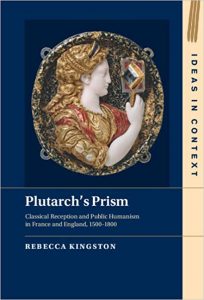
Plutarch’s Prism: Classical Reception and Public Humanism in France and England, 1500–1800
Throughout the early modern period, political theorists in France and England drew on the works of Plutarch to offer advice to kings and princes. Elizabeth I herself translated Plutarch in her later years, while Jacques Amyot’s famous translations of Plutarch’s The Parallel Lives led to the wide distribution of his work and served as a key resource for Shakespeare in the writing of his Roman plays, through Sir Thomas North’s English translations. Rebecca Kingston’s new study explores how Plutarch was translated into French and English during the Renaissance and how his works were invoked in political argument from the early modern period into the 18th century, contributing to a tradition she calls ‘public humanism’. This book then traces the shifting uses of Plutarch in the Enlightenment, leading to the decline of this tradition of ‘public humanism’. Throughout, the importance of Plutarch’s work is highlighted as a key cultural reference and for its insight into important aspects of public service.